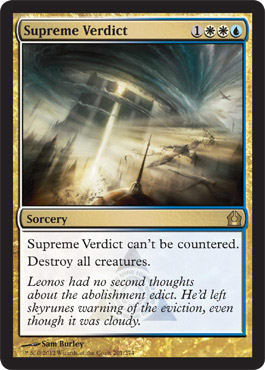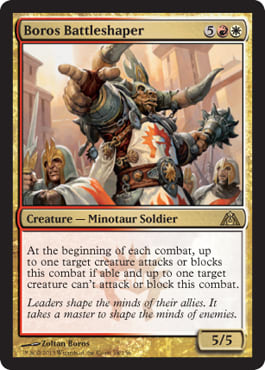Pro player Sam Black recently started a conversation among writers on whether the right play exists regardless of the players in a game or whether player strengths shape that play. Adrian Sullivan wrote an excellent article balancing all the factors, and in that article, he created an off-the-cuff list of eight Magic skills players might consider when determining their individual best plays.
As someone who's written both that many skills translate from casual to tournament Magic and that level of proficiency determines what you can do with a card, Adrian's list immediately struck me as a great springboard for understanding how our attributes shape our play and where we might improve. As Adrian put it,
Adrian's eight Magic skills are:
- Card Valuation
- Pacing
- Combat
- Counterspell Wars
- Life Management
- Bluffing
- Strategic Planning
- Mental Stamina
That's a great list by itself, but if you think of other skills, put them in the comments. Sensing where we are on each of brings gets us closer to the right plays in whatever Magic we're playing than cliché self-descriptors like, "I don't do aggro well," or, "I hate playing blue." With each skill, I'll list a common myth, whether the statement's simply untrue or too simple to be ordinarily useful, and use that to go into deeper discussion.
Card Valuation
The Myth: Cards fall on one important spectrum: powerful/unpowerful.
The Reality: Outside a handful of cards, context is key.
I'm not sure anyone believes the myth stated that bluntly. But I've heard plenty of players substitute "powerful" for any analysis. If a card powers whatever Standard deck a player is playing, he or she will call it "powerful" to whomever is in earshot and rag on last week's hot deck. But it's clear that calling Soldier of the Pantheon, Thassa, God of the Sea, Desecration Demon, Magma Jet, and Sylvan Caryatid all "powerful" doesn't advance evaluation or deck-building.
I've gone into some of this before, so to discuss card valuation as an independent skill, here are some things I think about, particularly when preorder time comes or I'm exploring a new card.
How good is it at whatever it does? The easiest way to misevaluate a card is to evaluate the desirability of the thing the card does rather than evaluate how efficient the card is at doing it. Desecration Demon was about $4 when it came out. Innistrad block had loads of small creatures to keep the Demon tapped most turns, so people didn't give it the time of day. As those decks faded—and especially when devotion showed up—the Demon was a good source of devotion while depriving opponents' devotion through tough choices. Desecration Demon is no longer a $4 card.
Obviously, the Demon didn't change; its environment did. Being a 6/6 flyer for ![]()
![]()
![]() is an incredible ratio; in the class of huge flyers, Desecration Demon is among the best. And unlike the old days, Wizards rarely prints a card whose drawback makes it unplayable; contrast Desecration Demon with Desecration Elemental. (By Gatherer comments, some people have succeeded with Desecration Elemental; I'm not one of them.) So focus on whether a card's base level is worthwhile. If it is, it's probably powerful and worth exploring. Dark Depths was the best at what it did—nothing else was making 20/20 indestructible flyers? It just needed Vampire Hexmage to come along and make the process more efficient than, say, Aether Snap.
is an incredible ratio; in the class of huge flyers, Desecration Demon is among the best. And unlike the old days, Wizards rarely prints a card whose drawback makes it unplayable; contrast Desecration Demon with Desecration Elemental. (By Gatherer comments, some people have succeeded with Desecration Elemental; I'm not one of them.) So focus on whether a card's base level is worthwhile. If it is, it's probably powerful and worth exploring. Dark Depths was the best at what it did—nothing else was making 20/20 indestructible flyers? It just needed Vampire Hexmage to come along and make the process more efficient than, say, Aether Snap.
What's its mana cost? Part of what makes Desecration Demon so good is that it's only 4 mana. You rarely need special circumstances to have to your 4-mana creature on time. Past 6 mana, you're usually in the cheat-it-out category in duels; in multiplayer, I'd move that line to 9 mana. But, sometimes, there's enough ramp available to make it work anyway.
Think of converted mana cost like assembling a combo. Desecration Demon is part of a five-card combo with four mana sources, whereas Sylvan Primordial is part of an eight-card combo with seven mana sources. The cheaper a card is, the fewer cards it needs to work, so the more likely it will have the chance to do its thing.
As a corollary, most 1-drops have a chance of playability. It's not as relevant in multiplayer as in duels, but if you want to represent answers while curving out, 1 mana's still much easier to work with. My decks don't always have the spare mana to hold up Krosan Grip or Cancel, but Nature's Claim and Swan Song are easy. In 2010, I ran a Grixis Pyromancer Ascension deck in Standard, with Cruel Ultimatum as its ideal spell to copy. Black gave me a couple 1-mana spells that helped me tremendously. One was Wretched Banquet, which could kill Joraga Treespeakers before they got nasty. But the main card I'm proud of from that deck is my sideboard Shadowfeeds. Useful against other Pyromancer Ascension decks as well as Sun Titan and maybe other things I'm forgetting, it was cheap enough that nobody could play around it, and that won me games.
Vector Asp had its moment in the Pro Tour. Ornithopter is not one of the ten worst cards of all time. Determine what a card can offer, and then look for how to use it.
Pacing
The Myth: I need to answer everything.
The Reality: Limited resources means picking your battles.
Assuming that pacing means "not wanting to vomit your removal over anything that breathes," I'm pretty bad at it. I like building decks with loads of removal, and this might be why—I'm far too indiscriminate with it. Michael Jacob is an expert at this in Drafts, saving his removal for things that will actually kill him. I am the anti-expert.
Why do I pace decks so terribly? Why is it so common for me to cast Supreme Verdict and then die to a creature cast the next turn? I can think of a couple reasons, presented in order of experience playing Magic:
Insecurity – When you start playing, it's customary for opponents to have advantages over you, largely due to experience. Like people who are afraid of public speaking might rush their speeches, so you might rush your game plan if you're afraid of your opponent. You know you're new, and your opponent knows you're new. And the more cards he or she plays, the more overwhelmed you feel. This leads directly into . . .
Sophomore Bravado – You've won a couple games, you're getting a handle on the rules, and you're starting to understand deck-building. Beating the people you couldn't beat at first feels like an accomplishment. And the result is that every Doom Blade on a halfway-threatening creature feeds that sense of accomplishment. The opponent was forming a plan, and you stuck this blade of pure doom right in it! Rahaha! That sense of winning a lot of battles, the feeling that you're doing something whereas you previously were powerless, like frayed ends, is both natural and damaging to healthy gameplay/hair. (Q: Where does Lovisa Coldeyes keep her hair-care products? A: On her Boreal Shelf. Boreal . . . because she's worth it.) When you keep winning battles like this but on balance keep losing the war, it leads to . . .
Pessimism – This is different than insecurity because it isn't an information gap—it's an interpretation gap. If you believe your opponent's going to top-deck Bonfire of the Damned every turn, you might as well throw your cards out early and get it over with. Fatalism encourages rushing; hope encourages patience.
When I face someone I consider more competent than I am, regardless of whether he or she is, I can become pessimistic and assume he or she will outmaneuver me. It happens most with players who spend more money on Magic than I do; that Japanese foil Umezawa's Jitte gets me feeling as though nothing I do can measure up. But it's an emotion from my insecurities outside Magic, and if I can separate it enough to play my deck at its pace, I'll win more, which will, in turn, make me less pessimistic.
So, while I consider myself very good on card valuation, I'm bad at pacing. What about combat?
Combat
The Myth: My deck has a lot of creatures, so I'm good at combat.
The Reality: If you have a lot of creatures, combat is easy. It's when you have a similar number of creatures as your opponent that you test combat skills.
Standard is the only main place where you can succeed without skill in combat. From a Limited Grand Prix to a prerelease to Commander tomorrow night, understanding when there's an open attack, which creatures an opponent considers too valuable to enter combat, and what will block where is the most reliable means to break a stalled board in your favor. Sometimes, attacking is obviously right, and sometimes, not attacking is obviously right. Your perception of the middle is the difference between winning and losing.
I consider myself serviceable at combat math, particularly in the complicated world of multiplayer. In duels, I probably should apply more pressure than I do. As in life, holding back is sometimes riskier than swinging in. Playing a tempo deck in a way that doesn't take advantage of that tempo is inherently risky, even if you think of it as saving your creatures. There comes a point in chess when you're up on material and one-for-one trading favors you; Magic can have that point, too, but it's harder to spot and subject to more variables. I need to understand that point much better than I do now. It's not a weakness as with pacing, but I'm far from where I want to be.
Next Time
I'll cover the other five topics in the next article. Until then, consider how you're doing on these three, and if anything's helped you improve these skills, please share it.
1 James, Bill, The Bill James Guide to Baseball Managers: From 1870 to Today (New York: Scribner, 1997), pp. 248–9.



























